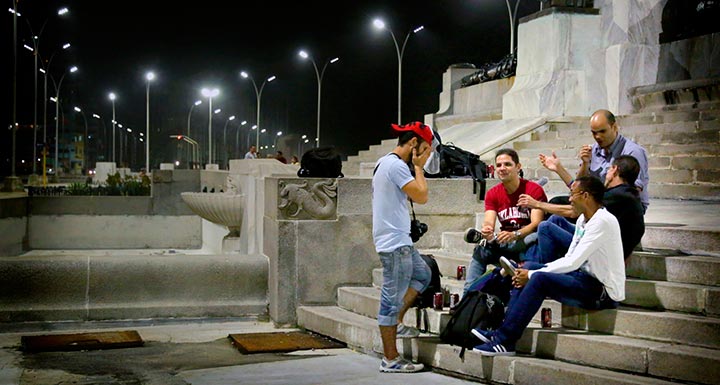
Cuba’s promising new online voices
At times, hitting the publish button feels like playing Russian roulette. Carlos Alberto Pérez, a blogger in Havana, is far from being a dissident. He works for the Ministry of Communication and has government-provided access to the Internet at work and at home. Mr. Pérez’s bedroom walls are covered with black-and-white photos of Che Guevara, the legendary Argentine guerrilla leader who helped catapult Fidel Castro to power in 1959. Yet to read his blog, La Chiringa de Cuba, is to get a gritty view of how much has gone awry in Cuba, a nation of 11 million, still governed, after five decades, under the mantra “socialism or death.”
“Here, everything works poorly,” said Mr. Pérez, who often wonders whether his next critical post could be his last. “The only thing that works well are the armed forces.”
Castro called on Cubans to be critical of the system, acknowledging that the Communist Party had failed its citizens in myriad ways. Cuba’s diverse and growing community of bloggers and independent journalists have done just that, becoming a powerful alternative to the official press, which for decades has delivered hyperbolic and dull content, but little substantive journalism.
Few segments of Cuban society will stand to benefit more from improved relations between Washington and Havana than this group. As Internet access on the island expands and the Cuban government can no longer credibly argue that the United States represents an existential threat, independent writers could become even more important agents of change.
For decades, Cuba’s state-run print and broadcast news media outlets have been mouthpieces for the Castros in assailing the United States as the “imperialist” scourge responsible for the country’s problems. The American government responded by spending hundreds of millions of dollars on Miami-based radio and television propaganda outlets to undermine Cuba’s leaders and destabilize the government.
An interesting middle ground emerged in 2007, when Yoani Sánchez, a piercing, evocative writer, began publishing blog posts online, describing the grim realities of everyday life in Havana. Her blog, Generación Y, became an international sensation and an irritant for the government, which has relentlessly and unfairly attacked her as an agent of the West. Some of her dispatches, which were uploaded from Internet cafes for tourists, have been unflinching in their criticism of the country’s leaders.
As Internet access became more common in state-run workplaces like universities, blogging began to flourish, with no clear ground rules. For those who had Internet access, two subjects were widely understood to be off limits: questioning the legitimacy of the top leaders or the viability of a Cuba’s Communist system. It didn’t take long for some bloggers to start pushing boundaries.
By 2012, La Joven Cuba, or The Young Cuba, a blog run by young professors at the University of Matanzas, had developed a healthy audience, getting nearly 3,000 visitors a day. Writers took veiled shots at the state and allowed uncensored reader comments. They dissected the downfall of authoritarian socialist systems in the 20th century and criticized the official press for being subservient to the Communist Party. A few months after the school held a blogger conference in April 2012, administrators blocked access to La Joven Cuba.
As other bloggers began taking on the cause of the Matanzas bloggers, the controversy reached the top echelons of the Cuban government. In March 2013, the first vice president, Miguel Díaz-Canel Bermúdez, who has been widely considered Raúl Castro’s successor, visited the university to meet with the blog’s administrators. His opening question startled them: What do you need to get La Joven Cuba back online? The question signaled that they had his blessing, a point he underscored by posing for a photo with the bloggers. Access to the blog was promptly restored.
“After that, there haven’t been many similar cases, and the tolerance for criticism has widened because it starts being seen as legitimate and healthy for society,” said Harold Cárdenas Lema, one of the blog’s founders.
Mr. Pérez caused an unusual stir this year by publishing a post about widespread cheating on university exams. When he alerted the Education Ministry that answer sheets for a coming exam were being sold, officials dismissed his allegation. After he published proof, officials arrested several people.
While authorities have tolerated criticism from bloggers like Mr. Cárdenas Lema and Mr. Pérez, they have censored other voices who have pressed for meaningful democratic reforms. Ms. Sánchez and a group of journalists started a digital news site, 14YMedio.com, in May, but the government blocked it for users on the island. “In Cuba, printing presses are more guarded than military bases,” Ms. Sánchez said in an interview in her Havana apartment. Besides being censored, she is vilified daily by anonymous blogs and on social media, which Western diplomats suspect are run by Cuba’s security agency.
The Cuban government earlier this month pledged to take steps to broaden Internet access in an editorial published in Granma, the main state-run newspaper. Not surprisingly, the editorial blamed the country’s backward infrastructure, and limited access, on American sanctions and Washington’s punitive policy toward Havana. President Obama’s dramatic policy shift last week will soon render those excuses obsolete. Steps being taken by Washington to make it easier for American technology companies to do business in Cuba could greatly increase Internet speed and access in the near future. Mr. Pérez, however, is skeptical.
“I don’t think the government is ready for widespread Internet,” he said. “If 200 bloggers give them headaches every day, what’s going to happen when a shoemaker has WhatsApp?”
It would be wonderful if Cuban leaders were courageous enough to prove him wrong by expanding Internet access and ceasing to censor voices that provide much-needed constructive criticism. If they aren’t, Cuba’s bloggers will be ever more equipped to take them on.
(From: The New York Times)
Video by Alexandra Garcia, Ernesto Londoño and Andrew Blackwell: here.

